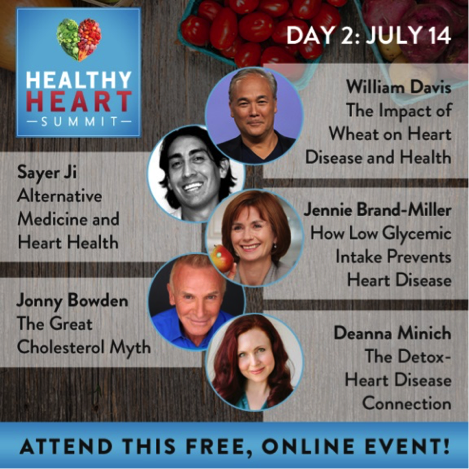Dr. Masley’s Healthy Heart Summit starts today! It’s not to be missed!
Here are the speakers for Day 1:

Here are the speakers for Day 2:

And some excerpts from the Dr. William Davis interview: The Impact of Wheat on Heart Disease and Health. It’s incredible! Dr. Davis is a cardiologist and the author of Wheat Belly. His focus with his heart patients is: no grains, fish oil, gut flora, fixing low D and addressing low thyroid!
Sound familiar? All of these can also be part of a program for improving mood and ending anxiety
Here are some excerpts:
- One of the earliest solutions was a very, very common abnormality in people with coronary disease – an excess of small oxidation prone LDL particles. So I used the data published by people like Ron Krauss in UC Berkeley and some others and took all the grains out of people’s diet. And lo and behold it works like a charm. That became a cornerstone of what I was doing for coronary disease.
- People were starting to tell me that the rheumatoid arthritis was going away and that their glaucoma had gone away, and their leg edema, hypertension, acid reflux, irritable bowel syndrome, bowel urgency, funny skin rashes, rosacea, rosacea-eczema, seborrhea, belly fat. All of these conditions reversed with elimination of grains.
- When I added vitamin D to the mix about eight, nine years ago, that’s when we saw dramatic reductions
- I published some of these data, by the way. [Here is one of his studies: Effect of a combined therapeutic approach of intensive lipid management, omega-3 fatty acid supplementation, and increased serum 25 (OH) vitamin D on coronary calcium scores in asymptomatic adults. It doesn’t get much attention because you know prevention doesn’t get the headlines. But lots of robotic surgery and things like that get the headlines.
- Fish oil, of course. Not a huge effect, but it does help. I love it because it reduces the after meal, postprandial flood of lipoproteins. It has a big effect on subduing that effect. Heart disease, as you know, develops in the after-eating few hours, not so much while you’re fasting.
- Thyroid normalization. I started paying attention to thyroid based on the Norwegian data suggests that a TSH of 1.4 or greater (in the presumed normal range) could as much as double or triple cardiovascular death. Lo and behold, it became a critical part of the management of coronary disease.
- And then lastly, most recently this notion of cultivating bowel flora. So we use so-called prebiotic fibers or resistant starches to purposely cultivate healthy species of bowel flora. And I’ll be darned. This has proven to be a critical piece.
- I’m sure my experience is similar to yours. I haven’t seen a heart attack in years. I used to see a couple of heart attacks a week when I was younger – just telling people to take the statin drug and cut their fat and exercise and eat everything in moderation and all that nonsense.
Wow! This is profound!
They go on to talk about how whole-wheat flour, white flour, and table sugar all have the same glycemic load and blood sugar response – which you know also plays a big part in anxiety.
And then one of my favorite sections is this discussion on opiates:
- If you eat the gliadin protein of wheat…same protein, by the way, in rye and barley. It’s called secalin in rye, hordein in barley and zein in corn. Sometimes you partially digest the small peptides about 5 amino acids long. Those peptides have very unique sequences rich in proline that make it very resistant to human digestion. Those five amino acid pieces act like opiates on the human brain.
- The effect of the opiates depend on your individual susceptibility. So if you’re a kid with ADHD or autistic spectrum disorder, it causes behavioral outbursts. If you are a paranoid schizophrenic, it causes paranoia and hearing voices. If you have bipolar illness, it triggers the mania, the high. [my addition: if you’re prone to anxiety and depression it can make your symptoms much worse and even be the main cause]
- If you have a tendency towards binge eating disorder or bulimia, it causes 24-hour a day food obsession.
- Now, in everyday people who don’t have any of those conditions, it only causes appetite stimulation, many many hundreds of calories more per day every day. It causes incessant hunger. You have to eat all the time.
Register at the following link for the Healthy Heart Summit – to hear the whole of the Dr. Davis interview and all the other great interviews: https://ez233.isrefer.com/go/summitreg/trudyscottcn/
If you know you want to purchase the interviews (digital or memory stick), here is the purchase link:
https://ez233.isrefer.com/go/summitorder/trudyscottcn/
Hello,
I often see information for low thyroid problems and Hashimoto’s, but I don’t think I’ve seen any information from you for hyperthyroidism. My boyfriend has hyperthyroidism, likely Grave’s disease (doctor is not 100% positive), and we are looking for reliable research and/or diet information related to this. Is this something you have written about or intend to write about any time soon?
Hi Jessica
Graves disease is not an area I have much experience with and with a condition like this you want to hear from experts. Like Hashimoto’s Thyroiditis, it is also an autoimmune condition so many of the autoimmune guidelines will still apply. Dr Amy Myers has written a great book “The Autoimmune Solution”, had Graves herself and has a great website. Here is an article she wrote on the topic http://www.amymyersmd.com/2014/02/hyperthyroidism/